Outcome in race for No 2 in Anwar’s party could pose political headache for him
JOHOR BAHRU: Malaysian Prime Minister Anwar Ibrahim could be left facing a political conundrum if his daughter Nurul Izzah Anwar clinches the deputy president post at his political party’s internal polls this weekend, analysts told CNA.
Nurul Izzah, 44, who is currently vice-president of her father’s Parti Keadilan Rakyat (PKR) party, is going head to head with the incumbent for the post and Malaysia’s Economy Minister Rafizi Ramli.
Based on campaign patterns and pledges of support from party members, observers said that Nurul Izzah is the favourite to win.
Yet, they added that this outcome could heighten divisions between the party factions and perhaps see Rafizi, 47, and his key supporters leave the party, drawing parallels with how Anwar’s former number two Azmin Ali resigned from PKR in 2020.
Analysts also highlighted that projected outcome in the polls will leave Anwar with a gaping hole in his Cabinet given that Rafizi has said he would resign as Economy Minister if he loses the contest.
James Chin, Professor of Asian Studies at the Asia Institute Tasmania, University of Tasmania, said that if Rafizi resigns, it might be a loss for Anwar as he is one of the “more rational ministers” who appeals to foreign investors.
“Anwar will have to find someone with a similar profile, and this is going to be hard, especially if he is casting his net only among PKR members (to maintain the Cabinet quota for the party),” said Chin.
At the same time, Nurul Izzah has pledged that she is not keen to join her father’s Cabinet if she clinches the deputy presidency, a move that analysts say has placed Anwar in a difficult position.
Observers said that while Anwar might be keen to appoint his party’s number two in key Cabinet positions to shore up PKR’s quota, doing so could risk exacerbating nepotism claims.
In his final campaign rally in Johor Bahru on Tuesday night (May 20), Rafizi all but admitted defeat in the contest, taking aim at perceived irregularities in the internal party system for voting.
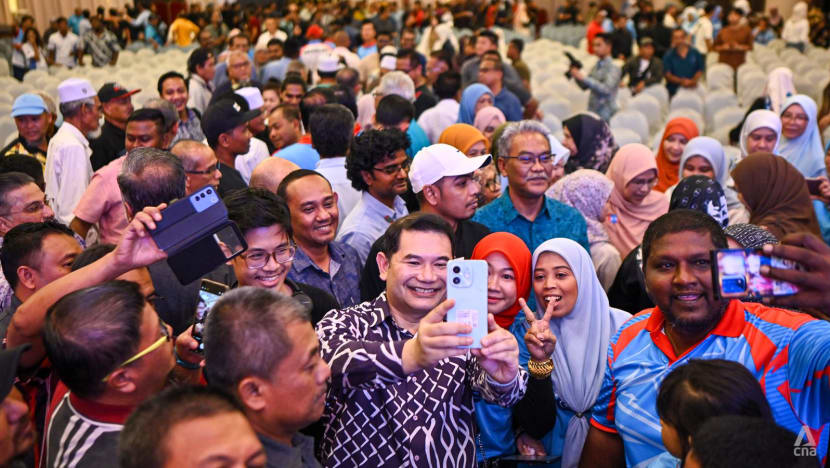
“I will not win. If it is announced that I win my heart might fail (in shock). I am not stupid, everything has been orchestrated and the signal to me is clear - ‘You will lose’,” said Rafizi to a crowd of roughly 500 party members and 25,000 viewers listening online.
Rafizi and party members aligned with him have previously raised concerns on voting irregularities - including vote rigging - which they claim have led to some of them losing their positions as divisional chiefs.
These include Natural Resources and Environmental Sustainability Minister Nik Nazmi Nik Ahmad, who lost the Setiawangsa chief position in April and Deputy Minister of Energy Transition and Water Transformation Akmal Nasir, who lost as Johor Bahru divisional head the same month.
“I have given up for some time … If this is the leadership line-up that they want, I have no issue. We will retreat with dignity and respect,” he added.
“But based on results and voting patterns we have calculated, actually I think that I’m leading in this race and I should have no problem winning (the deputy presidency) … but the problem is the (unfair) system.”
COULD DEFEAT PUSH RAFIZI OUT OF PKR?
Regional political risk analyst Harrison Cheng, who is director of the Singapore-based consultancy Control Risks, told CNA that he feels Nurul Izzah’s entry into the deputy presidency contest appears to be “orchestrated rather than organic” and that this could potentially ostracise Rafizi and his supporters from the party.
Cheng was referring to how Nurul Izzah had initially said in March she was keen to defend her vice presidency at this year’s congress but later threw her hat in the ring for the deputy presidency following pledges of support from other key party leaders.
These include Anwar’s senior political secretary Shamsul Iskandar Md Akin and Selangor chief minister Amirudin Shari.
“If Anwar fails to properly manage the fallout of the Rafizi episode, we could see yet another damaging split within the party,” said Cheng, referring to how Rafizi and party members aligned to him are perceived to be sidelined by the party.
He cited how PKR could see a repeat of what happened in 2020 when Azmin and 10 Members of Parliament (MPs) who were aligned with him resigned from the party, accelerating the fall of the Pakatan Harapan (PH) government.
“Azmin’s departure was the culmination of efforts by Anwar to sideline him, having seen Azmin’s clout grow within PKR. The parallels with the current situation are arguably a cautionary tale for Anwar as he continues to seek consolidation of control over his own party,” added Cheng.
Chin told CNA that such a split is likely to occur, especially if Nurul Izzah wins by a landslide.
“If the winning margin is huge, it can be difficult for both sides to reconcile the results. Members from Rafizi’s side could push him to leave the party and join a new party or form a new party,” he said.
Azmi Hassan, a senior fellow at the Malaysia-based think-tank Nusantara Academy for Strategic Research, told CNA that he feels some sympathy for Rafizi as he feels that a large portion of the party’s machinery has placed its weight behind Nurul Izzah’s candidacy.
He cited how Rafizi has declined to officiate the party’s youth and women's national congress on Thursday - a long-standing party tradition for the incumbent deputy president - likely because he “might be heckled or booed”.
“I feel that Rafizi is not competing on a level playing field,” said Azmi.
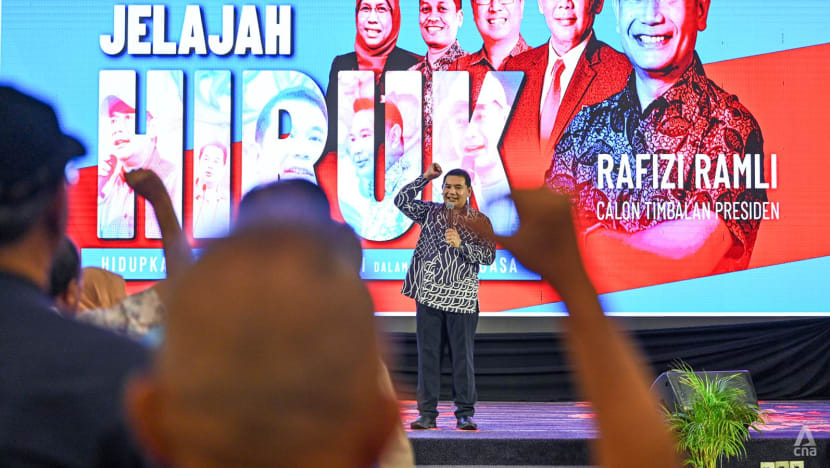
On top of managing a potential rift in his party, analysts added that if Nurul Izzah wins as expected, Anwar will also need to fill a key position in his Cabinet.
The minister of economy manages key government initiatives like the Johor-Singapore Special Economic Zone (JS-SEZ) and the RON95 fuel subsidy implementation.
PKR veteran member and MP for Pasir Gudang Hassan Karim told CNA that Rafizi’s ultimatum to quit the Cabinet if he loses puts party members “in a difficult position” going into the internal polls as they might feel obliged to vote for Rafizi to not leave Anwar in a pickle.
“It can be viewed as the honourable thing to do - I lose, I resign. But it’s akin to holding members at ransom by making a threat,” said Hassan.
“It’s not healthy to do this - he should contest first and … only offer to resign after the polls,” added the lawyer.
Speaking to reporters on Wednesday night, Anwar maintained that there are no plans to make changes to his Cabinet regardless of who wins the party’s deputy presidency.
“This is a contest between two close friends and loyal allies. It doesn't raise any question about changes in the Cabinet … there are no plans to make any (Cabinet) reshuffle,” said Anwar.
“(PKR delegates) should pick the candidate who will strengthen the grassroots and synergise all of the party’s strength,” he added.
Analysts also noted that Anwar, who is also minister of finance, maintains oversight on key important economic policies and is working closely with the trade ministry under Tengku Zafrul Abdul Aziz to help Malaysia cope with the impact of tariffs imposed by United States President Donald Trump.
Cheng told CNA: “We do not expect significant disruption to the Malaysian government’s engagement with the US government even if Rafizi leaves the cabinet.
“As for the RON95 subsidy removal, Rafizi just indicated that the plan has been transferred to the finance ministry following a Cabinet decision.
“And finally for the JS-SEZ, Anwar already has a working relationship with the Johor state government and the Johor Sultan (also the king), and therefore has both the political capital and the desire to see the project through in Rafizi’s absence,” he added.
CAN NURUL IZZAH LEAD EFFECTIVELY AMID NEPOTISM CLAIMS?
Analysts posited that behind the scenes, Anwar might be keen to replace Rafizi and PKR’s spot in the Cabinet with Nurul Izzah if she wins the deputy presidency.
The move would allow the hopeful PKR deputy president, who is also presumptive heir apparent to Anwar in a PH-led federal government, experience a key position at the national level.
However, Nurul Izzah is not an elected MP following her high-profile defeat in the last 2022 general election in the family stronghold seat of Permatang Pauh.
Her defeat has been attributed to the green wave, a phenomenon in which many Malay-majority seats in the rural areas of northern peninsular Malaysia were won by the Perikatan Nasional (PN) opposition coalition.
If Nurul Izzah were to enter the Cabinet, she would first need to be appointed as a senator.
The three-term MP has already said that she does not wish to take up a Cabinet position even if she clinches the deputy presidency, a move analysts told CNA is pre-emptive to distance her from nepotism allegations.
They added that this clout of nepotism hanging over her leadership role could hinder her ability to be an effective number two to Anwar.
“Rafizi has said in his campaign that nepotism will not be accepted and it's akin to giving PKR’s opponents ‘bola tanggung’,” said Azmi, using a term from the sepak takraw sport, referring to giving opponents an easy avenue to critique the party.
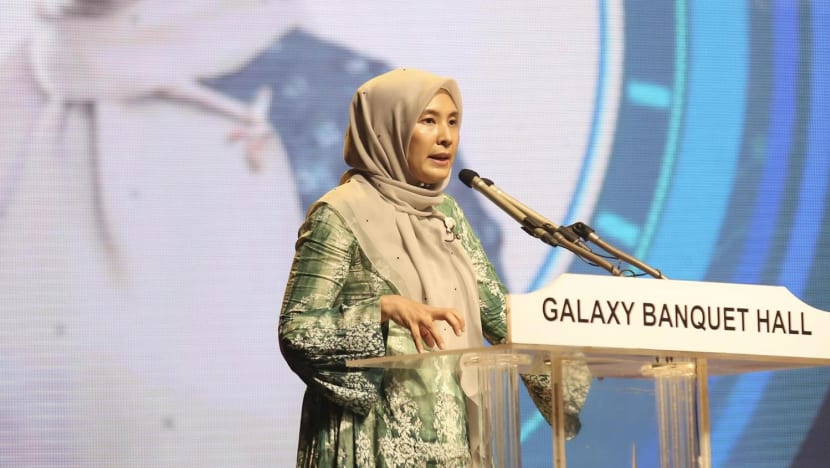
Chin echoed similar sentiments, highlighting how a father-daughter partnership in PKR’s leadership would be the “number one issue” opponents will use to “whack the party with”, given voters’ sensitivity to politicians favouring their own family members.
He added that if Nurul Izzah wins, this issue is likely to come to the fore in the next general elections and PKR and its allies - parties like Parti Amanah Negara (Amanah), Democratic Action Party (DAP) and the United Malays National Organisation (UMNO) - could suffer in terms of vote share.
“Nepotism is an invisible red line in Malaysian politics that leaders should not cross. A father-daughter partnership holding a senior position in the party (and potentially federal government) is a no-go at the present moment … voters won’t accept this,” he added.
Meanwhile, Cheng said how PKR has been struggling to retain voter support amid “public disenchantment with the Anwar administration’s perceived failure to live up to reform pledges”, evident from lower voter turnout among PH’s voter base in the various by-elections.
“As it is, PH is struggling to keep pace with the opposition PN in winning the Malay vote … However, if more and more PH voters decide to cast a protest vote against Anwar’s coalition in the next general election in 2028, this would give PN an advantage and we could see PH-UMNO losing the election,” said Cheng.
JUXTAPOSED CAMPAIGN STYLES: IS AN UPSET ON THE CARDS?
As both Nurul Izzah and Rafizi wrap up their campaigns ahead of the party congress polls on Friday, what is apparent is their distinct campaign styles, embodied by their respective slogans.
Rafizi’s faction, which also includes Nik Nazmi and Negeri Sembilan Chief Minister Aminuddin Harun who are both contesting to defend their vice presidency posts, is campaigning under the slogan “hiruk”.
It is the short form for “hidupkan idealisme reformasi dalam ujian kuasa”, which means reviving reform ideals while in power. The term “hiruk” also means creating chaos, which analysts said encapsulates Rafizi’s direct and confrontational style of campaigning.
In his final rally on Tuesday, Rafizi took aim at how PKR has recently permitted many new members who have allegedly hopped over from other parties to join and contest to become supreme council members in the upcoming polls.
One of the members he singled out was former Malaysian Indian Congress treasurer R Ramanan, who joined the party in 2020 after the Sheraton Move which saw PN seize power from PH after its collapse due to infighting, and is now contesting to be vice president.
“We know that our heads will roll (following the polls) but we must remind the party that parachuting candidates into key positions must stop. This is a party that promotes based on merit and the right principles,” Rafizi said.
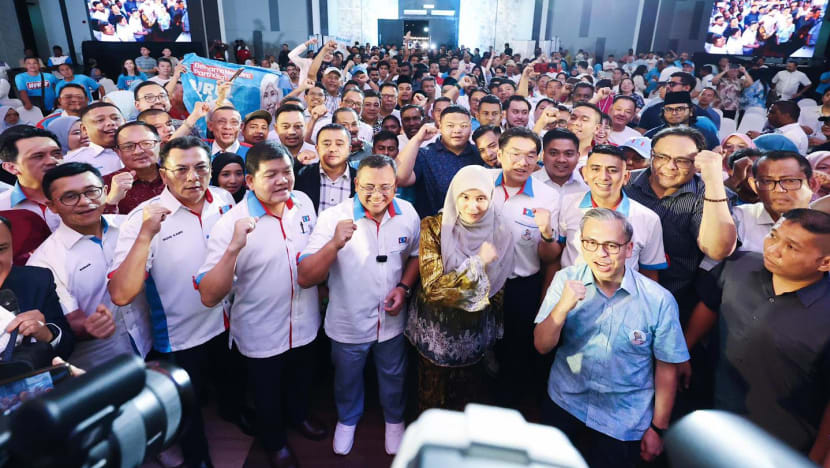
On the other hand, Nurul Izzah’s campaign slogan is “damai”, or peace. She has been actively trying to engage the grassroots in events across the Peninsular and East Malaysia.
Observers pointed out that Nurul Izzah’s approach has been more defensive, citing how she has rejected Rafizi’s offer to debate.
Instead, she has focused efforts on reuniting the party, outlining in her rally in Negeri Sembilan on Monday night that PKR risks being obsolete over the next decade if its members do not synergise.
“The target of (PKR capturing) the 50 marginal seats (in the next national polls) and cooperation among one another is vital, because I don’t want us to lose what we have achieved in five to 10 years,” she said.
The PKR congress kicks off on Thursday night with elections for its youth and women wings.
Those challenging for the supreme council positions are scheduled to make their speeches on Saturday morning. Results are expected to be announced from 2.30pm on Saturday.
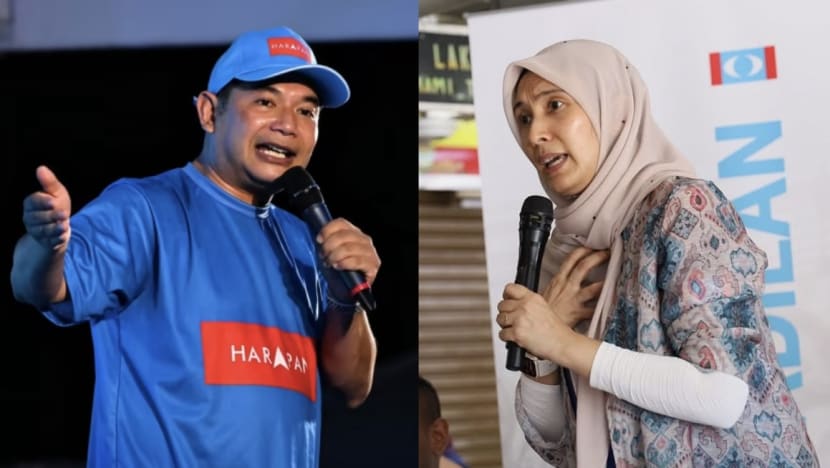
While Nurul Izzah is seen as a favourite to win given that she has garnered open support from more than half of the party’s 222 divisions, veteran PKR MP Hassan Karim warned that the contest could be closer than many anticipate, given Rafizi’s experience in contesting for the post.
“I think we shouldn’t jump to conclusions easily, this is Nurul Izzah’s first time contesting for the post, But Rafizi is contesting for the third time, he has lost before against Azmin Ali (in 2018), and he won against Saifuddin Nasution (in 2022),” said the 74-year-old, who has publicly pledged his support for Nurul Izzah for this year’s polls.
“Rafizi is a strategic thinker, he was the party’s strategic director in the last general election and he has strong supporters in the party, so Izzah’s supporters cannot be overconfident,” added Hassan.
Overall, Hassan outlined that a likely “tight contest” is a positive sign for the party as it showcases healthy competition.
“It’s a contest between two friends … two individuals who are capable leaders and should play a key part in PKR’s leadership and the national government moving forward,” he said.
Additional reporting by Aqil Haziq Mahmud
免责声明:投资有风险,本文并非投资建议,以上内容不应被视为任何金融产品的购买或出售要约、建议或邀请,作者或其他用户的任何相关讨论、评论或帖子也不应被视为此类内容。本文仅供一般参考,不考虑您的个人投资目标、财务状况或需求。TTM对信息的准确性和完整性不承担任何责任或保证,投资者应自行研究并在投资前寻求专业建议。
热议股票
- 1
- 2
- 3
- 4
- 5
- 6
- 7
- 8
- 9
- 10